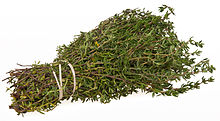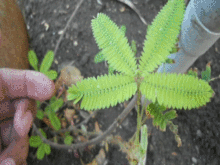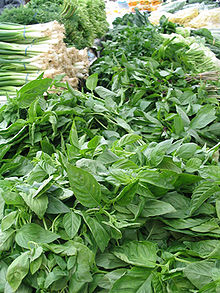- Herb
-
This article is about culinary, medicinal, and spiritual herbs. For the technical botanical usage, see herbaceous plant. For other uses, see Herb (disambiguation).
Except in botanical usage, an herb (
 i/ˈhɜrb/ or US /ˈɜrb/)[1][2] is any plant that is valued for flavor, scent, medicinal, or other qualities.[3] (Botanists use the same term differently, for any non-woody flowering plant, regardless of its flavor, scent or other properties, and thus include only grass-like plants and forbs.)
i/ˈhɜrb/ or US /ˈɜrb/)[1][2] is any plant that is valued for flavor, scent, medicinal, or other qualities.[3] (Botanists use the same term differently, for any non-woody flowering plant, regardless of its flavor, scent or other properties, and thus include only grass-like plants and forbs.)Herbs have a variety of uses including culinary, medicinal, and in some cases spiritual usage. General usage differs between culinary herbs and medicinal herbs. In medicinal or spiritual use any of the parts of the plant might be considered "herbs", including leaves, roots, flowers, seeds, resin, root bark, inner bark (cambium), berries and sometimes the pericarp or other portions of the plant. Culinary use of the term "herb" typically distinguishes between herbs, from the leafy green parts of a plant (either fresh or dried), and spices, from other parts of the plant (usually dried), including seeds, berries, bark, root and fruit.
Contents
Culinary herbs
 A bundle of thyme
A bundle of thyme
Culinary herbs are distinguished from vegetables in that, like spices, they are used in small amounts and provide flavor rather than substance to food.
Many culinary herbs are perennials such as thyme or lavender, while others are biennials such as parsley or annuals like basil. Some perennial herbs are shrubs (such as rosemary, Rosmarinus officinalis), or trees (such as bay laurel, Laurus nobilis) – this contrasts with botanical herbs, which by definition cannot be woody plants. Some plants are used as both an herb and a spice, such as dill weed and dill seed or coriander leaves and seeds. Also, there are some herbs such as those in the mint family that are used for both culinary and medicinal purposes.
Medicinal herbs
Main article: HerbalismPlants contain phytochemicals that have effects on the body.
There may be some effects when consumed in the small levels that typify culinary "spicing", and some herbs are toxic in larger quantities. For instance, some types of herbal extract, such as the extract of St. John's-wort (Hypericum perforatum) or of kava (Piper methysticum) can be used for medical purposes to relieve depression and stress. However, large amounts of these herbs may lead to toxic overload that may involve complications, some of a serious nature, and should be used with caution. One herb-like substance, called Shilajit, may actually help lower blood glucose levels which is especially important for those suffering from diabetes. Herbs have long been used as the basis of traditional Chinese herbal medicine, with usage dating as far back as the first century CE[4] and far before.
 Mimosa pudica (Sensitive Plant), is a creeping annual or perennial herb.
Mimosa pudica (Sensitive Plant), is a creeping annual or perennial herb.
Medicinal use of herbs in Western cultures has its roots in the Hippocratic (Greek) elemental healing system, based on a quaternary elemental healing metaphor. Famous herbalist of the Western tradition include Avicenna (Persian), Galen (Roman), Paracelsus (German Swiss), Culpepper (English) and the botanically inclined Eclectic physicians of 19th century/early 20th century America (John Milton Scudder, Harvey Wickes Felter, John Uri Lloyd). Modern pharmaceuticals had their origins in crude herbal medicines, and to this day, many drugs are still extracted as fractionate/isolate compounds from raw herbs and then purified to meet pharmaceutical standards.
Some herbs are used not only for culinary and medicinal purposes, but also for psychoactive and/or recreational purposes; one such herb is cannabis.
Sacred herbs
Main article: Sacred herbsHerbs are used in many religions. For example, myrrh (Commiphora myrrha) and frankincense (Boswellia spp) in Christianity, the Nine Herbs Charm in Anglo-Saxon paganism, the neem tree (Azadirachta indica) by the Tamils, holy basil or tulsi (Ocimum tenuiflorum) in Hinduism, and many Rastafarians consider cannabis (Cannabis sp) to be a holy plant. Siberian Shamans also used herbs for spiritual purposes. Plants may be used to induce spiritual experiences for rites of passage, such as vision quests in some Native American cultures. The Cherokee Native Americans use white sage and cedar[which?] for spiritual cleansing and smudging.
Pest control
Main article: Pest controlHerbs are also known amongst gardeners to be useful for pest control. Mint, spearmint, peppermint, and pennyroyal are a few such herbs. These herbs when planted around a house's foundation can help keep away unwanted creatures such as flies, mice, ants, fleas, moth and tick amongst others. They are not known to be harmful or dangerous to children or pets, or any of the house's fixtures. Herbs are often used to repel pests from vegetable and flower gardens.
See also
- Herb chopper
- Herbaceous plant
- Pot herb
- Apothecary
- Herb garden
- The Herb Society of America
- International Herb Association
- List of herbs and spices
- Prehistoric medicine
- Strewing herb
References
- ^ Cambridge Advanced Learners' Dictionary, Cambridge University Press: headword "Herb" Online version
- ^ Wells, Professor John, Longman Pronunciation Dictionary, Longman Education, March 2000, ISBN 0-582-36467-1
- ^ "Dictionary.com". http://dictionary.reference.com/browse/herb. Retrieved 2007-12-19.
- ^ "Chinese Herbal Medicine". http://www.acupuncturehemelhempstead.com/chineseremedies.html. Retrieved 2007-12-19.
External links
Cuisine Regional African · Americas · Arab · Asian · Caribbean · Central Asian · Eastern European · European · Sami · Latin American · Mediterranean · Middle Eastern · North African · South Asian · West African
National Afghan · Albanian · Algerian · American · Argentine · Armenian · Australian · Austrian · Azerbaijani · Bahraini · Bangladeshi · Belarusian · Belgian · Belizean · Beninese · Bhutanese · Bolivian · Bosnia and Herzegovina · Botswanan · Brazilian · British · Bulgarian · Burkinabe · Burmese · Cambodian · Cameroonian · Canadian · Catalan · Chadian · Chilean · Chinese · Colombian · Congolese · Croatian · Cuban · Cypriot · Czech · Danish · Dutch · Ecuadorian · Egyptian · English · Equatorial Guinean · Estonian · Ethiopian · Filipino · Finnish · French · Georgian · German · Greek · Guatemalan · Honduran · Hungarian · Icelandic · Indian · Indonesian · Iranian · Iraqi · Irish · Israeli · Italian · Ivorian (Côte d'Ivoire) · Jamaican · Japanese · Jordanian · Kazakh · Korean · Kuwaiti · Lao · Latvian · Lebanese · Libyan · Lithuanian · Luxembourg · Macedonian · Malagasy · Malaysian · Maltese · Mexican · Moldovan · Mongolian · Moroccan · Native American · Nigerian · Nigerien · Norwegian · Omani · Pakistani · Palestinian · Panamanian · Peruvian · Polish · Portuguese · Qatari · Romanian · Russian · Salvadoran · Saudi Arabian · Scottish · Serbian · Sicilian · Singaporean · Slovak · South African · Spanish · Sri Lankan · Sudanese · Swazi · Swedish · Swiss · Syrian · Taiwanese · Thai · Tunisian · Turkish · Trinidad and Tobago · Ukrainian · United Arab Emirati · Uruguayan · Uzbekistan · Venezuelan · Vietnamese · Welsh · Yemeni
Historical Styles Cuisine classique · Fast food · Fusion · Haute cuisine · Immigrant · Modernist · Molecular gastronomy · Nouvelle ·
Types of food Confectionery · Dairy products · Fruit · Herbs / Spices · Meat · Vegetable
Carbohydrate staples Types of dish Technical See also Witchcraft and magic Types African witchcraft (Witch smeller · Vodun) · Asian witchcraft (Kulam) · European witchcraft (Akelarre · Benandanti · Brujería · Cunning folk · Seid · Völva · White witch · Witch Cult) · Asian witchcraft · North American witchcraft (Appalachian Granny Magic · Hoodoo · Huna · Pow-wow · Santería · Vodou · Voodoo) · South American witchcraft · Australasian witchcraft (Makutu) · Contemporary witchcraft (Feri Tradition · Hedge witchcraft · Stregheria · Wicca)Practices Animism · Coven · Divination · Familiar animal · Familiar spirit · Flying ointment · Herbcraft · Magic · Necromancy · Occultism · Poppet · Potions · Satanism · Spiritism · Spiritualism · Sigils · Shamanism · Witch ball · Witch's ladderFolklore and mythology Agamede · Aradia · Baba Yaga · Circe · Drude · Elbow witch · Hecate · Huld · Kalku · Medea · Obayifo · Witch of Endor · Sorginak · Spearfinger · Weird sisters · Sea witchMajor historic treatises Documentary film Categories:- Herbs
Wikimedia Foundation. 2010.

